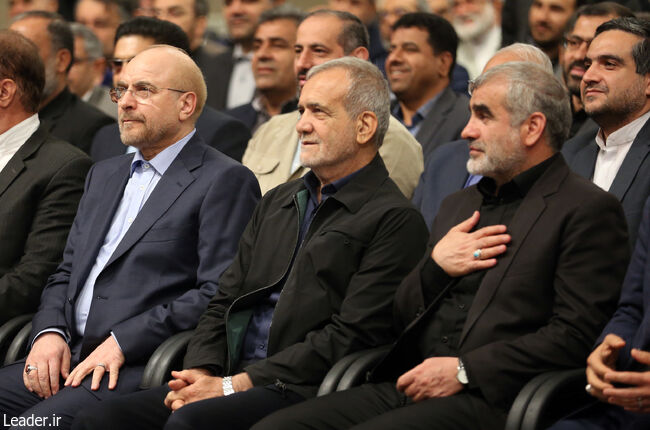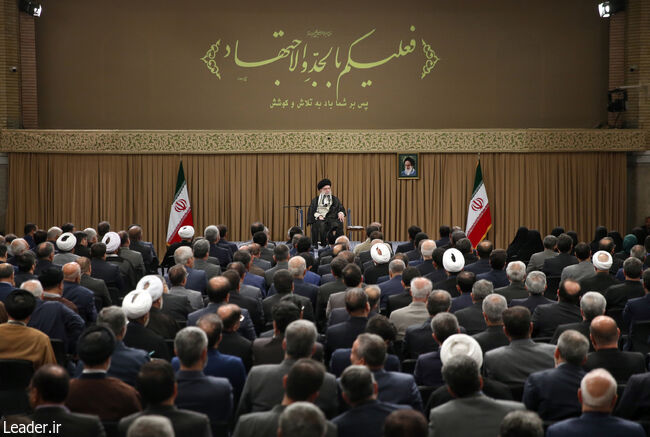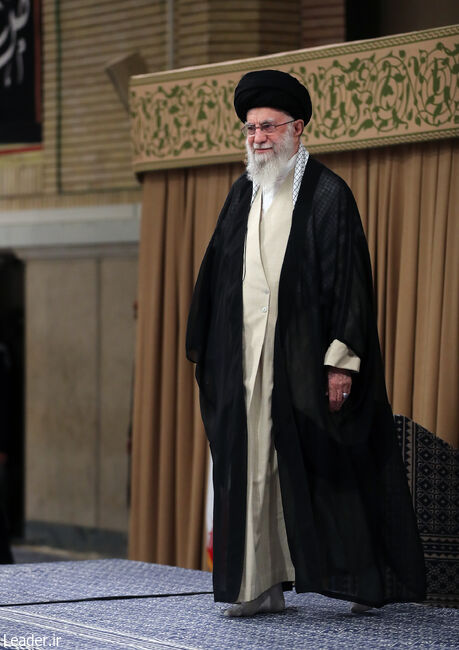In a meeting this morning with the President and Parliamentary representatives, the Leader of the Islamic Revolution outlined eight important points:
The necessity for parliamentary accountability,
Constructive interaction between Parliament and the new government,
A unified voice from the country's institutions on important issues,
The dominance of ethics in parliamentary debates and other activities of representatives,
The do's and don'ts of legislation,
Supervision without excessiveness or deficiency,
Effective activity of the Supervisory Board on the performance of representatives and
Serious engagement of Parliament in global issues and foreign policy.
He expressed the hope that, with the shared sense of responsibility of the elected President and Parliament, a cabinet composed of faithful, efficient, revolutionary individuals who are hopeful about the future, known for their integrity and honesty, possess a national perspective, and hold a deep belief in the Islamic Republic will be formed and will advance the country's and people's issues.
In his first meeting with the Twelfth Parliament, Ayatollah Khamenei described the Parliament's position as very important and sensitive. He said, "Contrary to public perception, the Parliament is not just a place where questions are asked. Like any decision-making and action-taking institution, it must be accountable to God and to the people for its duties and performance."
He added, "Of course, we do not have a mechanism for the Parliament's accountability to the people, but we can observe the people's satisfaction or dissatisfaction in their reaction to its performance".
In this regard, the Leader of the Revolution said, "In the past, the actions of some parliaments were not pleasing to the people, and for this reason, they lost their favour. Therefore, each representative must adjust their behaviour, speeches, positions, and performance in conformity with the need for accountability."
The second point that the Leader of the Revolution elaborated on was convergence and constructive interaction among the branches of government. He said, "The various pillars of the system must form a unified entity, and achieving this goal requires interaction and cooperation, and sometimes even leniency and overlooking certain matters."
Ayatollah Khamenei saw the cohesion of the various levels of government as necessary for the country, the system, and the people. Referring to the presence of the newly elected President as a representative of the Twelfth Parliament, he added, "Just as I have always called on the Parliament to have constructive interactions with administrations, I have also urged and emphasised that Parliament cooperate with administrations."
The Leader of the Revolution considered Mr Pezeshkian's success in economic, cultural, international, and other fields to be a success for everyone. He said, "We must all help the elected President fulfil his duties, and I sincerely believe that his success will be a victory for all of us."
He pointed to the necessity of a unified voice from the different levels of the government on important issues and added, "Some people worldwide are listening closely to find signs of discord in the statements of officials; the different levels of the government should speak with one voice to dishearten them."
Ayatollah Khamenei also deemed the dominance of ethics in parliamentary debates absolutely necessary and said, "The Parliament should be a centre for spreading a positive atmosphere and fostering calm and tranquillity in public opinion. They should refrain from repeating the actions of some representatives in previous sessions, such as painting a bleak picture and being negative, and should not agitate the people's minds."
He said, "The behaviour and speech of representatives outside the Parliament and in cyberspace should also safeguard the psychological security of the people, promote unity, create calm, and encourage the nation."
Highlighting an important point about the vigilance of the country's officials and politicians, the Leader of the Revolution said, "We are aware that the cyber army of the common enemy of all Iranians insults them while deceptively pretending to be their rivals, political factions, or trusted religious and political figures, to provoke and anger the other side and force them to respond. Therefore, you should not assume that everything you see in cyberspace is the work of your political rivals."
The fourth point the Leader addressed to the members of Parliament was the dos and don'ts of legislation. He described making legislation as Parliament's primary duty, setting the course and preparing a roadmap for the function of all branches and institutions. He added, "The goal of legislation should be the country's progress and serving the people."
Ayatollah Khamenei stressed the increased use of experts, saying that the clarity and unambiguity of law are essential to prevent exploitation by experts who can circumvent it. He said laws should be passed with a view to the country's capacities and resources and should be enforceable.
Aligning laws with higher-level documents and avoiding the accumulation of laws were two other points that the Leader of the Revolution addressed regarding legislation. He also called the excessive submission of legislative proposals problematic. He said, "The Constitution allows the Parliament to submit proposals, but in doing so, the number of proposals should be limited to avoid the accumulation of laws and the backlog of numerous proposals awaiting consideration."
Reminding the gathering about urgent matters requiring legislation, he said, "Sometimes governments need a law for an urgent task in the fields of international relations or economic and developmental issues. In such cases, they often take the easy route and seek permission from the Leader, which is granted only in emergencies. However, it is also better for the Parliament to expedite legislation in urgent matters."
Regarding general legislative policies that had been issued in previous years, Ayatollah Khamenei stated that implementing these policies requires the enactment of laws. He added, "The Parliament has not yet legislated in this area, and this task needs to be completed promptly."
The Leader of the Revolution also remarked on Parliamentary oversight of the executive branch using tools such as questioning, warnings, and investigations.
He reminded the representatives in this regard: First, the goal of oversight is to enhance the government's efficiency; therefore, political, personal, and factional issues should never influence the use of oversight tools. Second, to avoid extremes and maintain fairness in oversight.
In his sixth recommendation to the members of the Twelfth Parliament, Ayatollah Khamenei said, "Sometimes, due to the improper behaviour of one representative, all 290 representatives are called into question, and the entire Parliament loses the people's favour. The purpose of establishing the Supervisory Board on the performance of representatives is to prevent instances like these from happening and, if they occur, to address them. However, the expected outcome from this board has not been achieved."
In his seventh recommendation, he pointed to Parliament's significant capacity in international affairs and foreign policy, saying, "The Parliament is an influential factor that governments worldwide use in their interactions. For example, at the negotiating table, they use the opposition of the Parliament or the laws it has passed as a defence or justification for their position."
Pointing out that the Parliament can strengthen the government's hand in foreign affairs, the Leader of the Revolution said, "A positive and impactful action of the Parliament in foreign policy is the Strategic Action Law of the Eleventh Parliament. Of course, some people criticised and objected to this law, but these criticisms are completely unfounded, and passing that law was a very correct action."
He considered the various roles of representatives in global developments and diplomacy, such as the trips and meetings of the Speaker and members of Parliament, including the useful presence of the Speaker at the recent BRICS summit, as impactful. He said, "Sometimes even a representative's statement or speech on foreign policy issues can be important and effective."
Ayatollah Khamenei called the utilisation of parliamentary support by governments a common practice worldwide and added, "One example is the Comprehensive Sanctions Law by the Americans against the Islamic Republic, known as 'CISADA,' which was passed by the U.S. Congress. The then-Democratic President, who was duplicitous, ill-intentioned, and, of course, more cunning than our officials, signed it, even though he claimed to cooperate with and support Iran and that he could have chosen not to sign it."
Referring to the recurring topic of sanctions during the elections, as mentioned by candidates and their representatives among the people, he mentioned that the Parliament has the potential to be active and play a role in this area. He said, "We can alleviate the sanctions with honourable means and even neutralise them. As we have repeatedly said, removing sanctions is not in our hands, and strategies must be devised to address them. However, neutralising the sanctions is within our power, and there are good ways to achieve this. Government officials have implemented some of these methods with positive results, and in this regard, the Parliament can also play a role."
The Leader's eighth and final point concerned the immediate and upcoming task of the Parliament, namely the vote of confidence for Mr Pezeshkian's cabinet.
He considered the prompt formation of the cabinet after completing the necessary procedures to be beneficial and essential. He said, "In this regard, both the members of Parliament and the elected and respected President have significant responsibilities."
Regarding the essential characteristics and criteria for individuals who will become ministers and take charge of the economy, culture, development, and production, Ayatollah Khamenei said, "We should appoint someone who is trustworthy, honest, devout, and deeply committed to the Islamic Republic."
He added, "Faith is an important criterion. Hope for the future and a positive outlook are other important criteria. Those with a pessimistic view of the future who believe that nothing can be done should not be given important and key responsibilities."
He mentioned adherence to religious principles, a reputation for honesty and integrity, a clean record, having a national perspective, and avoiding entanglement in political and factional issues as additional essential criteria for members of the Fourteenth Cabinet. He said, "Both the elected President and the Parliament must adhere to these criteria, as they share a joint responsibility in selecting the country's officials."
Ayatollah Khamenei expressed his hope that by adhering to these criteria and fulfilling the shared responsibilities of the President and Parliament, a capable, devout, and revolutionary cabinet will be appointed that can advance the country's interests.
In the final part of his speech, he considered the issue of Gaza as still being the primary concern of the Islamic world. He added, "Despite the months that have passed since the beginning of the crimes of the evil usurper regime, the initial enthusiasm in condemning and confronting these atrocities has diminished among some people. However, the importance of the Gaza issue is even greater than in the previous days."
The Leader of the Revolution spoke about the increasing power of the resistance and said, "A massive political, economic, and military apparatus called the United States, along with the usurper Zionist regime, are fighting against a small group known as the resistance. Since these two malevolent forces have failed to defeat Hamas and the resistance, they are dropping their bombs on hospitals, schools, and on women, children, and innocent people."
He pointed out that today, the people of the world are witnessing the most heinous crimes and savagery of the usurper regime and are judging it. Addressing the members of Parliament, he added, "Do not be at ease or remain silent regarding Gaza. Today, a significant example of the Parliament's activity in foreign affairs and diplomacy is the issue of Gaza."
Before the Leader of the Revolution's remarks, the Speaker of the Islamic Consultative Assembly highlighted the completion of the previous Parliament's efforts in setting the course and overseeing the proper implementation of economic and strategic laws as one of the most important tasks for the Twelfth Parliament. He stated that the new Parliament considers itself a supporter of the elected government in addressing the people's issues and added, "The focal point and common axis for the Twelfth Parliament and the Fourteenth Administration is the emphasis on implementing the general policies of the government, especially the Seventh Development Plan Law."
Mr. Qalibaf drew attention to the issues of vulnerable and underprivileged groups and the demands of the middle class as other priorities for the new Parliament. He added that representatives will focus their efforts on addressing the demands of "the people, elites, and supporters of the Islamic Revolution" while avoiding getting caught up in distractions and false dichotomies.
Other points made by the Speaker of the Islamic Consultative Assembly during the meeting of the people's representatives with Ayatollah Khamenei included avoiding factionalism and offering empathetic support to the new government, addressing the demands of all voters, strengthening the structural connection between representatives and their constituencies, and employing new oversight methods to address weaknesses.



